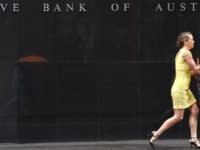The RBA says rate cuts are on the table

The RBA has shifted its position on the outlook for domestic interest rates.
Philip Lowe says the probability of the next move in Australia's cash rate is "more evenly balanced".
He previously stated that the next move in the cash rate was likely to be higher.
The shift in opinion has seen the Australian dollar and Australian government bond yields fall sharply.
RBA Governor Philip Lowe has shifted the central bank's position on the outlook for domestic interest rates.
Here's the key phrase he used in a speech in Sydney just now:
"Looking forward, there are scenarios where the next move in the cash rate is up and other scenarios where it is down. Over the past year, the next-move-is-up scenarios were more likely than the next-move-is-down scenarios. Today, the probabilities appear to be more evenly balanced."
This is a significant shift from the RBA.
Previously, Lowe had stated that he believed the next move in the cash rate was likely to be higher, although not in the near-term.
As seen in the RBA's February Monetary Policy Statement released on Tuesday, Lowe suggested that downside risks for the economy had increased in recent months.
"We will be monitoring developments in the labour market closely," he said.
"If Australians are finding jobs and their wages are rising more quickly, it is reasonable to expect that inflation will rise and that it will be appropriate to lift the cash rate at some point.
"On the other hand, given the uncertainties, it is possible that the economy is softer than we expect, and that income and consumption growth disappoint.
"In the event of a sustained increased in the unemployment rate and a lack of further progress towards the inflation objective, lower interest rates might be appropriate at some point.
"We have the flexibility to do this if needed."
Lowe reinforced that, in his opinion, there isn't a "strong case for a near-term change in the cash rate".
"We are in the position of being able to maintain the current policy setting while we assess the shifts in the global economy and the strength of household spending," he said.
"It has long been the Board's approach to avoid reacting to the high-frequency ebb and flow of news.
"Instead, we have sought to keep our eye on the medium term and put in place a setting of monetary policy that helps deliver on our objectives of full employment, an inflation rate that averages between 2% to 3% and financial stability."
While Lowe says the RBA's focus is what policy settings will be appropriate to achieve its policy mandates over the medium-term, the recent signals on the Australian economy haven't been all that good, helping to explain why financial markets, and a small but increasing number of economists, now see the next move in the cash rate as being lower.
Retail sales tanked in December, and barely grew during the quarter after price movement were taken into consideration. New car sales are also falling while activity levels at retailers deteriorated at the fastest pace in six years in January.
The vast majority of housing market indicators, especially for prices and credit growth, have continued to weaken over the New Year period. The downturn has also weighed heavily on building approvals, construction sector activity and new home sales over the past six months.
Australian business conditions, as conveyed by those surveyed by the NAB, were deemed to have deteriorated at the fastest pace since the GFC in December last year.
While labour market conditions remain firm, this well know as a lagging economic indicator, providing more of a message on how the economy was faring several months ago rather than today. While job vacancies sit at record highs, a number of alternate leading labour market indicators have softened quite noticeably in recent months.
Given the recent signals, hinting the slowdown in the Australian economy seen in the September quarter likely continued in Q4, it's any wonder why markets have moved to price in the likelihood of a rate cut since the RBA last met.
And that's before the slowdown in the global economy is factored into the equation, including in China, Australia's largest trading partner.
In his speech, Lowe said the bank is expecting a "stronger GDP outcome in the December quarter, with other indicators of economic activity painting a stronger picture than suggested by the September quarter national accounts".
While Lowe remains confident the September quarter slowdown is unlikely to be repeated, confirming that Australian GDP sees GDP expanding this year, he remarks on the cash have had an immediate impact on the Australian dollar, seeing it fall to .7174 against the greenback, down 0.8% for the session.
Australian government bond yields have also fallen, signaling an increased chance the RBA may reduce rates this year.
Prior to today's speech, financial markets saw the odds a 25 basis point cut in the RBA cash rate by the end of this year at around 50%. That probability has now shifted to 80% in response to Lowe's remarks.
Make your money work with Yahoo Finance’s daily newsletter. Sign uphereand stay on top of the latest money, news and tech news.
Now read: Aussie hotspots enjoying a sudden property boom
Now read: Will Shorten and Trump help or hinder the economy?

 Yahoo Finance
Yahoo Finance 

